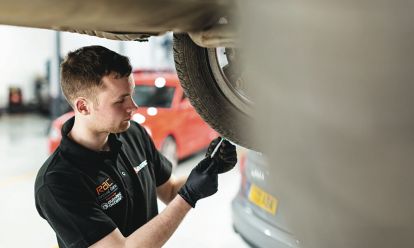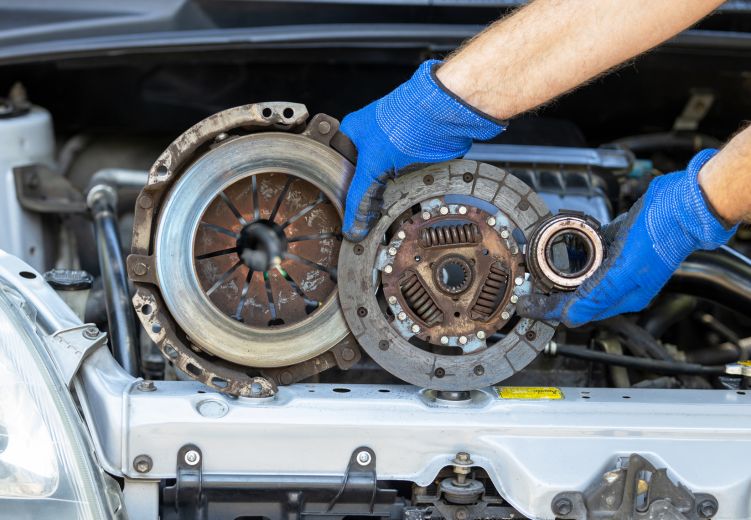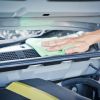However, no matter the age of the vehicle, if this is happening to your clutch, it is a serious problem that needs to be addressed immediately.
In most situations, the clutch will need to be replaced, which can come with a large bill. However, sometimes there is a quick fix.
This guide looks into what to expect when your gear starts slipping and what you can do about it.
Are you experiencing a car fault, warning, or mechanical problem? Find a local mechanic with the RAC.
What is clutch slipping?
Clutch slipping happens when a clutch fails to adequately engage or disengage the transmission (gear box), causing the vehicle to slip out of gear or to struggle to stay in gear when accelerating.
This can happen due to a worn-out clutch through years of wear and tear, an improperly adjusted clutch, or a lack of lubrication.
Clutch slipping can be dangerous, as it can cause the car to lose power while accelerating, and make it difficult to control the vehicle.
It is a frustrating experience for anyone driving a manual vehicle and is a common problem that can have a number of causes.
Clutch slipping symptoms
Below is a list of the most common things you will notice if your clutch is starting to slip:
1. Grinding noises coming from the gear box
2. Difficulty shifting gears when you engage or disengage the clutch
3. Vehicle suddenly judders, jerks or stutters when moving forward or when shifting into gear
4. Unusually high RPMs when accelerating as the gear slips out
5. Large vibrations coming from the gear box (you will be able to feel this if your hand is on the gear stick)
6. Strong, burning smell coming from the gear box
7. The clutch pedal feels soft and spongy when pressed with force – there should be some resistance when you press down on the pedal
8. Clutch pedal sticking or refusing to return to its original position (this will happen once you have started moving)
9. Accompanied with one of the above; the vehicle will not deliver its full perfomance.
10. If you have had your vehicle for more than a decade and it hasn’t been regularly serviced, your mechanic will highlight that it has been worn down at your next MOT
If you have noticed any of the above, then it is important to take it to a trusted local garage or contact a mobile mechanic as soon as possible.
Get a service or repair at home
RAC Mobile Mechanics can come to you, saving you the hassle of going to a garage.


Is it dangerous?
Clutch slipping can be dangerous, as it is an integral part of a vehicle.
Should the issue persist then it can cause major damage to your car’s gear box and other parts of the engine.
When the clutch fails to engage fully, it will likely cause a jerking motion in the car and put extra strain on the gear box. This can lead to damage in the transmission, but also can lead to erratic driving.
Both of these can result in dangerous scenarios for the driver, passengers, and other roads users.
Clutch slipping can also lead to premature wear on the clutch and other components of the gear box and related systems. A side effect if there isn’t a suitable amount of lubrication is intense heat. Not only will it lead to quicker wear and tear, but other issues will arise.
More heat than normal could lead to further damage to other components, including the flywheel and pressure plate.
In addition, clutch slipping can also cause dangerous driving conditions. It can interfere with your ability to change gears smoothly, and can even cause the car to stall. This can be particularly dangerous if you are driving at high speeds and need to accelerate quickly or brake suddenly.
Finally, clutch slipping can be a sign of other underlying issues with your car, such as a faulty clutch cable or a low fluid level. If you suspect your clutch is slipping, it is important to get it checked out by a professional mechanic as soon as possible to prevent further damage.
Can you drive with a slipping clutch?
Although it is technically possible to drive with a slipping clutch, it is very dangerous to do so.
Therefore, if you notice any of the symptoms of a slipping clutch then you should get it seen by a local garage or mechanic as soon as possible.
Driving with a slipping clutch can lead to dangerous scenarios and cause further damage to your vehicle.
Once it starts to slip, your clutch could start degrading rapidly, so don’t leave it as you could end up breaking down or being involved in an accident.
Does it damage your car?
In short, yes, a slipping clutch can cause wider damage to your vehicle.
When it starts to happen, a slipping clutch will generate large amounts of heat, which will damage other parts of the engine, melt plastics, and can lead to overheating.
It will also permanently damage your gearbox if you drive with a slipping clutch for an extended period of time.
What causes your cutch to slip?
When it comes to the reasons why your clutch might be slipping, there are a few common things you should be looking out for.
These include age of the vehicle, avoiding regular maintenance, lack of servicing, and the impacts of a more aggressive driving style.
Due to clutches being one of the most active parts of the vehicle, over the years and thousands of miles it wears down to a point where it will either need replacing, or you may need a new vehicle.
The most common cause of clutch slipping is wear and tear on the clutch plate. Over time, the clutch plate begins to slip, resulting in a loss of power. This can be caused by a number of factors, such as constantly driving in stop-and-go traffic, or not quickly disengaging the clutch after changing gears. This is known as 'riding the clutch'.
Clutch slipping can also be caused by a low fluid level in the clutch system. To check this, you should look the fluid level in the master cylinder and refill it if necessary. Topping up the lubrication in your vehicle should be a regular occurrence and will extend the life of your vehicle.
However, If the clutch plate itself is worn down, it may need to be replaced. But, if the clutch plate is in good condition, then the problem may be a worn clutch release bearing. There is a small bearing at the end of the clutch pedal that is responsible for releasing the clutch plate when the pedal is depressed. If the bearing is worn, it will need to be replaced.
A faulty cable can cause the clutch to slip and will also need to be replaced.
Most of these issues will need to be resolved by a mechanic with an extensive knowledge of how a gearbox and clutch works.
Service, repair or MOT?
You can trust the RAC with our local approved garages and NEW mobile mechanics.


How do you fix it?
In the vast majority of cases, you cannot fix a slipping clutch. However, the reason for it slipping may be due to an aggressive driving style, so if you have an older car with a cable operated clutch then adjusting it might help.
Should you think that your clutch is starting to slip, the best practice is to get an expert to take a look.
On the rare occasion that it can be fixed, it will likely be as a result a clutch needing to be adjusted to line up correctly – and reduce the friction within the gear box.
Can you fix it yourself or does it require a mechanic?
Unless you have experience as a mechanic and know how a clutch system works, then it is strongly advised to leave it to the professionals.
A local garage or trained mechanic will be able to assist in repairing or replacing the necessary parts – along with any other issues your vehicle may have.
How much does it cost to replace a clutch?
The average cost for a new clutch (including fitting) is between £600 and £800. However, this can vary a lot depending on the type of vehicle. The work can take up to six hours to complete.
Prices accurate as of March 2024 - whocanfixmycar
Is it worth replacing my clutch?
If you have a slipping clutch and it needs replacing – the cost can be quite high.
Also, clutch slipping is a common problem in older (and arguably less valuable) vehicles.
Therefore, if your car is worth only a few thousand, then you should consider whether it is worth getting it fixed, or scrapping the vehicle and getting a new vehicle.
If your current car also has other issues, it may be worth looking elsewhere.
Although there may be other factors to consider, it is worth looking at all options before you make a decision.
MORE: Clutch replacement cost - how much will you have to pay?

Cheaper than AA Price Promise^
• Roadside cover from £5.29 a month*
• We get to most breakdowns in 60 mins or less
• Our patrols fix 4/5 breakdowns on the spot

What happens when your clutch goes out while driving?
When your clutch goes out while you are behind the wheel, you will likely experience a few noticeable issues.
The most obvious symptom is that you won’t be able to change gears – however, make sure to look out for these other potential problems.
If the clutch is slipping, the engine might rev up, but the vehicle won’t accelerate as expected. It feels like the engine is working hard, but the car isn’t moving as it should.
You may also hear grinding noises when attempting to change gears, especially if the clutch isn't fully disengaging.
In some cases, the clutch is worn out, so it may be hard to start moving when first turning on the engine.
Sometimes, the clutch pedal may feel spongy, or it may stay stuck to the floor. This could indicate a fluid leak or damage to the clutch system.
If your clutch goes out entirely while you're driving, it could lead to dangerous situations. For instance, if you can’t disengage the clutch, you may be unable to stop the car properly without stalling, or the engine could over-rev.
If any of these occur, stop the car as soon as possible and call a mobile mechanic.
Clutch FAQs
- How much is a new clutch?
If you are looking to get a new clutch, it will cost you between £200 and £600. This doesn’t include the labour costs to carry out the work. The price can be a lot higher is you drive a more premium make and model of vehicle.
- How does a clutch work?
Push the clutch pedal (left sided pedal on a manual), to release the pressure plates - change gear - then slowly release the pressure to re-engage the gear.
- What does a clutch do?
In short, it disengages the gears from the engine, giving the driver more control over the vehicle as it accelerates or slows down.
- How long does a clutch last?
This can vary wildly depending on driving style, make, model, age, and whether your car has been suitably serviced and maintained. However, most clutches will last between 30,000 and 150,000 miles. This means that some vehicles could have the same clutch for their entire lifespan - but others may need to be frequently replaced.
- What is riding the clutch?
If you leave your clutch pedal down, while a gear is still in use, then you are riding the clutch. Over time, this will damage the clutch and dear system.
- What happens when your clutch goes out while driving?
If your clutch breaks while driving, you will lose connection between the transmission and the engine - meaning your car will come to a stop and you will need to get it seen by a mechanic as soon as possible.
- What is a clutch slip?
This is when you slip out of the gear you are in while driving a manual car. It will likely be proceeded by squeaking sounds and a juddering engine.
- What will happen if you hold the clutch pedal down for too long?
This will lead to freewheeling or ‘coasting’ of your vehicle. Doing this is dangerous as it means you have less control over your vehicle.
- Where is the clutch fluid located?
Your clutch fluid is located in the engine bay, and it will be easy to locate due to the cap being labelled ‘clutch fluid reservoir’ in most engines.
- What is double clutching?
Although this only applies to large trucks and speciality vehicles, this is when a driver engages the clutch to take it out of gear - then re-engages it while in neutral - to then engage it again to change gear.
- Replacement costs











